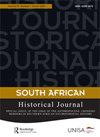‘The Great Trek Towards Nazism’: Anti-Fascism and the Radical Left in South Africa During the Early Apartheid Era
IF 1
3区 历史学
Q1 HISTORY
引用次数: 0
Abstract
ABSTRACT In May 1948, three years after the end of World War II, the National Party rose to power in South Africa and started to implement its doctrine of apartheid. In response, activists from various sections of the opposition to apartheid regularly invoked anti-fascist and anti-Nazi rhetoric. Their anti-fascist language combined global concepts – heavily borrowed from the struggle against fascism and Nazism in Europe in the 1930s and 1940s – with the colonial and racialist realities in South Africa. By doing so, activists contested the alleged uniqueness of the conditions in South Africa – conditions that justified, according to Afrikaner Nationalists, the need for apartheid policies. Our study aspires to explore postwar anti-fascism in the anti-apartheid discourse of radical South Africans in the early years of apartheid. We argue that by using specific anti-fascist tropes in their political discourse, South African radicals appropriated this language within the specific South African context, giving it new – sometimes contradicting – meanings that served their local interests of opposing nationalist authoritarianism, apartheid and white supremacy.《走向纳粹主义的伟大跋涉》:种族隔离早期南非的反法西斯主义和激进左翼
1948年5月,第二次世界大战结束三年后,国民党在南非掌权,并开始实施其种族隔离主义。作为回应,来自反对种族隔离的各个部门的活动人士经常援引反法西斯和反纳粹的言论。他们的反法西斯语言结合了全球概念——大量借鉴了20世纪30年代和40年代欧洲反法西斯主义和纳粹主义的斗争——和南非的殖民主义和种族主义现实。通过这样做,活动人士对所谓南非条件的独特性提出了质疑——根据阿非利卡民族主义者的说法,这些条件证明了种族隔离政策的必要性。本研究旨在探讨种族隔离初期激进南非人反种族隔离话语中的战后反法西斯主义。我们认为,通过在他们的政治话语中使用特定的反法西斯修辞,南非激进分子在特定的南非背景下挪用了这种语言,赋予其新的(有时是矛盾的)含义,以服务于他们反对民族主义威权主义、种族隔离和白人至上主义的当地利益。
本文章由计算机程序翻译,如有差异,请以英文原文为准。
求助全文
约1分钟内获得全文
求助全文
来源期刊

South African Historical Journal
Multiple-
CiteScore
0.70
自引率
0.00%
发文量
37
期刊介绍:
Over the past 40 years, the South African Historical Journal has become renowned and internationally regarded as a premier history journal published in South Africa, promoting significant historical scholarship on the country as well as the southern African region. The journal, which is linked to the Southern African Historical Society, has provided a high-quality medium for original thinking about South African history and has thus shaped - and continues to contribute towards defining - the historiography of the region.
 求助内容:
求助内容: 应助结果提醒方式:
应助结果提醒方式:


